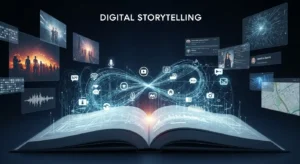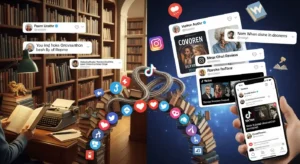Introduction
The world of literature is undergoing a significant transformation thanks to advancements in technology. From AI-generated novels to interactive eBooks and digital storytelling, technology is not only changing how stories are told, but also how readers experience them. The lines between traditional literature and emerging tech are becoming increasingly blurred, leading to new forms of storytelling that are immersive, interactive, and personalized.
In this post, we explore the various ways in which technology is reshaping literature, from artificial intelligence and digital formats to the rise of interactive books and new platforms that enhance the storytelling experience.
AI-Generated Literature: The Future of Writing
One of the most exciting developments in technology’s intersection with literature is the rise of AI-generated writing. With the development of sophisticated AI models like OpenAI’s GPT-3 and GPT-4, it’s now possible to create entire novels, poems, and short stories generated by machines. These AI tools can analyze vast amounts of existing texts, learning language patterns, narrative structures, and even creative style.
While the idea of AI writing books may sound futuristic, it’s already happening. Several publishers are experimenting with AI-generated content, offering novels that are indistinguishable from human-written works. In 2025, more and more authors are using AI as a co-writer, helping them overcome writer’s block, generate plot ideas, and even craft dialogue. Some entirely AI-written books are hitting the shelves, opening the door for a new form of literary creation.
AI-generated literature raises important questions about authorship and originality. If an AI generates a book, who owns the rights to that book? And can AI truly replicate the creativity and emotional depth that human authors bring to their work? These questions will continue to be explored as AI technology advances, making its mark on the future of writing and publishing.
Digital Storytelling: The Evolution of Interactive Narratives
 Another area where technology is changing literature is through digital storytelling. The rise of digital platforms has opened up new possibilities for authors and readers alike. Interactive eBooks, multimedia content, and web-based stories are allowing readers to engage with literature in ways that were never possible before.
Another area where technology is changing literature is through digital storytelling. The rise of digital platforms has opened up new possibilities for authors and readers alike. Interactive eBooks, multimedia content, and web-based stories are allowing readers to engage with literature in ways that were never possible before.
Platforms like Kindle, iBooks, and Wattpad have made it easier for authors to publish digital books and for readers to access them on-the-go. But digital storytelling goes beyond just reading a book on a screen. Some eBooks now feature interactive elements, allowing readers to influence the story’s direction through choices they make, much like a “choose-your-own-adventure” book, but with much more complexity.
In addition, augmented reality (AR) and virtual reality (VR) are increasingly being integrated into storytelling experiences. Books with AR features allow readers to scan pages with their smartphones, revealing hidden content such as 3D images, animations, or even voiceovers. VR, on the other hand, provides an immersive experience where readers can “enter” the world of the story, interacting with characters and environments in a way that’s completely new to traditional storytelling.
The Role of Social Media in Shaping Modern Literature
 Technology is also changing the way literature is discovered and consumed. Social media platforms like Instagram, Twitter, and TikTok are playing an increasingly influential role in how books go viral and how authors connect with their audiences.
Technology is also changing the way literature is discovered and consumed. Social media platforms like Instagram, Twitter, and TikTok are playing an increasingly influential role in how books go viral and how authors connect with their audiences.
On BookTok, for instance, a community of readers shares their love for books, creating trends around specific titles or genres. This has led to a new wave of book marketing, where viral moments on social media translate into significant sales for authors and publishers. The impact of social media is also evident in how authors engage with their readers. Many authors now use platforms like Twitter and Instagram to share updates, interact with fans, and even crowdsource ideas for their next books.
Additionally, the rise of digital book clubs, virtual author events, and online discussions has made reading more social than ever before. Readers now have direct access to authors through live Q&A sessions, online book launches, and interactive book clubs that connect people from all over the world. This level of engagement is changing the relationship between authors and readers, making literature a more dynamic and communal experience.
The Impact of Technology on the Publishing Industry
Technology is not just transforming how books are written and read, but also how they are published. The traditional publishing process is undergoing a significant shift, with technology streamlining everything from manuscript submission to book distribution. Digital publishing platforms, print-on-demand services, and self-publishing tools are giving authors more control over their work, allowing them to bypass traditional publishing houses.
Print-on-demand services, for example, allow authors to print copies of their books only when they’re needed, cutting down on waste and reducing upfront costs. These services also enable authors to reach global audiences without the need for large-scale publishing deals. This democratization of the publishing process has led to an explosion of self-published authors, giving voice to a wider range of voices and perspectives.
On the other hand, AI is making its way into the publishing industry through tools that assist with editing, proofreading, and even marketing. AI-powered software can analyze text, offer suggestions for improving writing style, and even help authors develop marketing strategies by analyzing market trends and reader preferences.
The Future of Technology in Literature
As we look to the future, technology will continue to push the boundaries of what literature can be. Advances in AI, VR, AR, and digital platforms will bring about new forms of storytelling, creating immersive and interactive experiences that could rival traditional books. The line between digital content and traditional literature will blur, offering readers entirely new ways to experience narratives.
The future of literature is undoubtedly digital, but it is also interactive, personalized, and immersive. Writers will continue to explore the use of AI as a co-writer, while digital formats will evolve to offer richer, more engaging content. The books of tomorrow may be a mix of text, visuals, audio, and even interactive elements that allow readers to become active participants in the story.
Conclusion
Technology is reshaping literature in ways we could never have imagined just a few decades ago. From AI-generated books to interactive eBooks and social media-driven trends, technology is influencing how stories are created, shared, and consumed. As the digital landscape continues to evolve, the future of literature will be defined by the fusion of technology and storytelling, offering readers a new and exciting way to experience the written word.
For more insights into how technology is changing literature, visit our Technology in Literature page.
